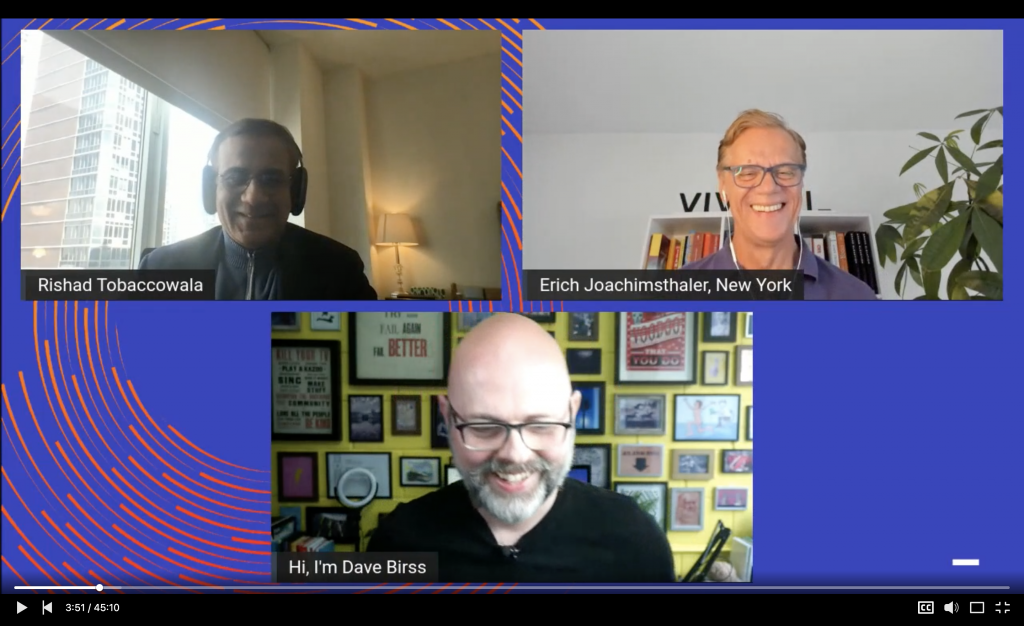Humanizing the Digital Age, with Rishad Tobaccowala
By Vivaldi, June 1, 2021
With the advancement of technology, there has been an increased emphasis on data and data-driven thinking. Every major business decision is based on spreadsheets and numbers rather than the people impacted by the decision. In an attempt to maximize efficiency and optimize profits, corporations have dehumanized their brand. This raises a fundamental question that every company and every individual, must answer: is it possible to stay human in the age of data?
Joined by Rishad Tobaccowala (Chief Growth Officer at Publicis Groupe), Erich Joachimsthaler (founder and C.E.O of Vivaldi) discusses why companies can’t solely rely on data, what these corporations should do to stay relevant, and how Gen-Z can upgrade their skill set and stay essential to the workforce.
Here are some of the key takeaways from their conversation:
1. Why staying human is still essential.
While data is more important than ever, there are multiple reasons why companies should not solely focus on the facts and figures. According to Tobaccowala, data is “like electricity”, illuminating a path and informing people, but the people these corporations target are still carbon based. For their target audience to see them positively, these companies should have meaning and purpose behind their brand and they should provide a human experience that’s just as good as their product. Rishad names Facebook as an example of a company that is doing well in numbers but is not necessarily providing their users with the best experience possible. It’s important to remember that at the end of the day all corporations are selling a story and they need to marry story and spreadsheet for their audience.
“Data is like electricity, it illuminates the way, it informs people. But at the end of the day, these data-driven companies can’t rely solely on the numbers because the people they are targeting are still carbon based.” – Rishad Tobacowala
2. How should brands keep up with the changing times?
When it comes to strategizing for the future, Rishad says that brands should think on what they want their future competitive advantage to be. This comes with questions such as: how should I be thinking about the future, how do I manage change, how do I lead in today’s environment, and how does Covid or any other external factors impact these decisions? He says it’s important to always keep your brand aligned with the future as well as the present (with a focus on changing technology, demographics, etc.) and to lead with competency, integrity, empathy, vulnerability, and inspiration. Yes, change is difficult, but irrelevancy is much worse and the only way to stay relevant is to always be looking ahead.
“Change is difficult, but irrelevancy is much worse.” – Rishad Tobaccowala
3. What are the skills Gen-Z need to successfully enter the post-pandemic workforce?
The age of data isn’t only impacting corporations, it’s also making it more difficult for people to enter the workforce with just their college degree. With Covid only worsening this situation, Tobaccowala advises that students and new grads do three things to ensure that they are always ahead of their career. His first tip is to make a 45-year plan. It isn’t enough to look a year or two out into the future anymore; you should learn what field you want to enter and plan for how you will change your skillset alongside that field for the remainder of your career. It’s also always important to prioritize learning over money. While this is easier said than done and it is often tempting for new graduates to go to the company with the better salary, choosing the company that is more aligned with future technology will keep you more aligned with the future — ensuring your relevancy in the workforce for years to come. Lastly, Rishad advises all new graduates to hone their communication, connection (empathy), and creativity skills. With data and technology streamlining so many roles, it’s important to remember that your greatest superpower is still your humanity and neither technology nor data will be able to compensate for that.
“Don’t underestimate the importance of communication, connection, and creativity skills. Those are what will set you apart from a machine.” – Rishad Tobaccowala
Conclusion
It’s evident that technology has increased our reliance on data, which can be quite powerful when it comes to making sound business decisions. However, this increased dependence on facts and figures can make it very easy for companies to detach from their audience as well as their employees. This makes it difficult for consumers to see the purpose and meaning behind these giant corporations. At the end of the day, it’s important to remember that brand building is about storytelling, desire, creativity, and selling the human experience. With tech only continuing to advance, we need to underscore the human component of corporations and often take a step back from the numbers.
Watch the full event here.
4:30: How covid has changed the workspace
7:10: What is business transformation
9:30: Is data driving the transformation
15:30: The 5 questions
21:40: Upgrading your operating models
29:00: What is future competitive advantage
32:43: Adjusting to the world of limited resources
37:45: Connections in the age of technology
41:30: The two levels of ESG
This segment was part of The Interaction Field Series of our LinkedIn Live Events. Please connect with us on our LinkedIn page to stay updated with our upcoming conversations.
- Topics:
- Events
Meet The Expert

Erich Joachimsthaler, Ph.D.
CEO & Founder
Erich is a rare combination of consultant, entrepreneur, academic, researcher, author and positive contrarian. Over the last twenty years, Erich has led Vivaldi in helping companies build strong brands, find innovation and new growth opportunities and realize them in today’s digital age.

